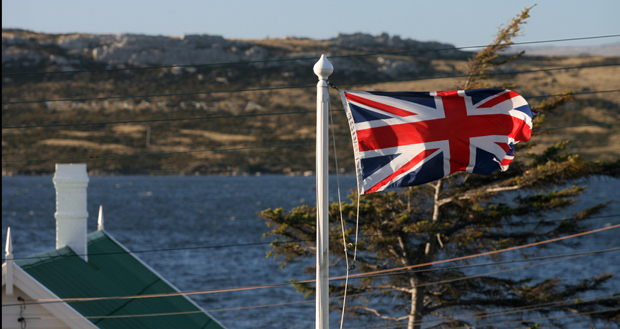Argentina accuses Cameron of 'irate' reaction in Falklands row
Heated exchange at Brussels dinner as Argentina's foreign minister raises colonialism at the table

A free daily email with the biggest news stories of the day – and the best features from TheWeek.com
You are now subscribed
Your newsletter sign-up was successful
Argentina has accused Prime Minister David Cameron of bad manners after a row over the Falkland Islands broke out at a European Union summit.
Cameron reportedly stepped in to defend Britain's claim on the islands after Argentina's foreign minister Hector Timerman urged the EU to support his country's fight against the "colonialist" British.
During a dinner in Brussels, where more than 60 EU and Latin American leaders met to discuss trade links, Timerman condemned the drilling by UK companies for oil and gas off the disputed South Atlantic islands.
The Week
Escape your echo chamber. Get the facts behind the news, plus analysis from multiple perspectives.

Sign up for The Week's Free Newsletters
From our morning news briefing to a weekly Good News Newsletter, get the best of The Week delivered directly to your inbox.
From our morning news briefing to a weekly Good News Newsletter, get the best of The Week delivered directly to your inbox.
"Extracting natural resources that belong to the Argentine people is totally illegal," he said. "Colonialism still persists, relying on the logic of appropriation of natural resources."
In a move designed to "delight" voters back home, Timerman told Cameron that the islands belonged to Argentina, reports the Daily Telegraph.
According to Argentine media reports, he said his government expected countries from the EU to support a United States resolution that urges Argentina and the UK to open a dialogue over the disputed territory.
In a heated exchange, Cameron apparently ordered Timerman to stop "threatening" the people of the Falklands and to "respect" the referendum in which islanders overwhelmingly voted to remain a British Overseas Territory.
A free daily email with the biggest news stories of the day – and the best features from TheWeek.com
Later, Argentinian President Cristina Fernandez de Kirchner described the Prime Minister's response as "irate, almost ill-mannered".
A spokesman for Cameron defended his intervention as "clear and robust".
He added: "It is completely unacceptable of Argentina to be threatening companies looking to invest in the Falkland Islands or in the waters surrounding there."
No direct mention was made of the 1982 war, in which 659 Argentinians and 258 Britons died after Buenos Aires invaded the islands.
-
 What to know before filing your own taxes for the first time
What to know before filing your own taxes for the first timethe explainer Tackle this financial milestone with confidence
-
 The biggest box office flops of the 21st century
The biggest box office flops of the 21st centuryin depth Unnecessary remakes and turgid, expensive CGI-fests highlight this list of these most notorious box-office losers
-
 The 10 most infamous abductions in modern history
The 10 most infamous abductions in modern historyin depth The taking of Savannah Guthrie’s mother, Nancy, is the latest in a long string of high-profile kidnappings
-
 Epstein files topple law CEO, roil UK government
Epstein files topple law CEO, roil UK governmentSpeed Read Peter Mandelson, Britain’s former ambassador to the US, is caught up in the scandal
-
 Iran and US prepare to meet after skirmishes
Iran and US prepare to meet after skirmishesSpeed Read The incident comes amid heightened tensions in the Middle East
-
 Grok in the crosshairs as EU launches deepfake porn probe
Grok in the crosshairs as EU launches deepfake porn probeIN THE SPOTLIGHT The European Union has officially begun investigating Elon Musk’s proprietary AI, as regulators zero in on Grok’s porn problem and its impact continent-wide
-
 Israel retrieves final hostage’s body from Gaza
Israel retrieves final hostage’s body from GazaSpeed Read The 24-year-old police officer was killed during the initial Hamas attack
-
 China’s Xi targets top general in growing purge
China’s Xi targets top general in growing purgeSpeed Read Zhang Youxia is being investigated over ‘grave violations’ of the law
-
 Panama and Canada are negotiating over a crucial copper mine
Panama and Canada are negotiating over a crucial copper mineIn the Spotlight Panama is set to make a final decision on the mine this summer
-
 Europe moves troops to Greenland as Trump fixates
Europe moves troops to Greenland as Trump fixatesSpeed Read Foreign ministers of Greenland and Denmark met at the White House yesterday
-
 Why Greenland’s natural resources are nearly impossible to mine
Why Greenland’s natural resources are nearly impossible to mineThe Explainer The country’s natural landscape makes the task extremely difficult